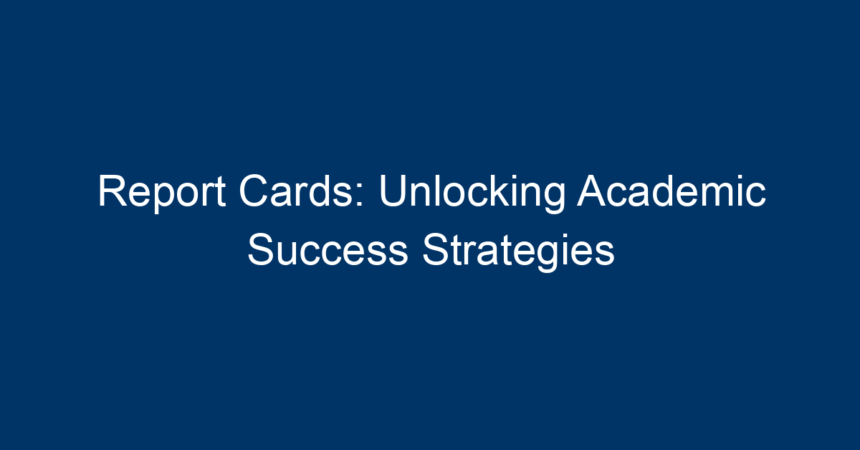Introduction
In the modern educational landscape, report cards serve not just as a means to communicate grades but as vital tools for unlocking academic success. These documents summarize a student’s performance and provide insights into areas of strength and opportunities for improvement. Whether you’re a parent, teacher, or student, understanding the significance of report cards can be the key to fostering academic growth and achievement. In this article, we will explore effective strategies to maximize the benefits of report cards, enabling stakeholders to enhance learning experiences and outcomes.
Understanding Report Cards
What are Report Cards?
Report cards are formal records that evaluate student performance in various subjects over a specific period. They usually include grades, teacher comments, attendance records, and other relevant details. They serve as indicators of academic performance and can significantly influence a student’s motivation, self-esteem, and future academic choices.
Importance of Report Cards
The importance of report cards goes beyond mere grades. They provide a snapshot of a student’s academic status and can highlight trends in performance over time. For parents and educators, report cards serve as a foundation for discussions about a student’s progress and can guide intervention strategies to address challenges promptly.
Strategies for Maximizing Report Cards
1. Frequent Communication with Educators
Engaging with teachers before, during, and after the release of report cards can pave the way for better understanding and improvement. Here’s how to foster effective communication:
- Schedule Meetings: Parents should not hesitate to set up conferences with teachers to discuss their child’s performance.
- Participate in Parent-Teacher Associations: These groups often discuss educational strategies in detail, providing parents with insights into the grading processes and academic expectations.
- Utilize Digital Platforms: Many schools offer online portals where parents can track academic progress in real-time. Familiarizing oneself with these tools can be beneficial.
2. Setting Academic Goals
Report cards allow students to set tangible academic goals based on their grades and teacher feedback. Here’s how to cultivate this practice:
- Analyze Report Card Feedback: Review comments thoroughly for strengths and weaknesses.
- Implement SMART Goals: Encourage students to set Specific, Measurable, Achievable, Relevant, and Time-bound goals based on report card insights. For example, if a student struggles in math, a goal could be to improve from a C to a B by the next grading period.
3. Encouraging Self-Assessment
Self-assessment fosters a growth mindset. By reflecting on their performance, students can take ownership of their learning. Here’s how to encourage this reflection:
- Create a Reflection Journal: Have students maintain a journal where they can write about their feelings regarding their report cards, areas they want to improve, and strategies to achieve those improvements.
- Positivity in Self-Assessment: Teach students to acknowledge their strengths, which encourages motivation and a balanced perspective on their progress.
4. Establishing a Support System
A robust support system can foster academic success reflected in report cards. Here’s how to build one:
- Peer Study Groups: Encourage students to form study groups with classmates to enhance understanding through collaborative learning.
- Tutoring: If a student consistently struggles in a subject, hiring a tutor can provide the personalized attention needed for improvement.
Leveraging Technology for Academic Success
1. Online Learning Resources
With a wealth of online resources available, students can take charge of their learning outside the classroom. Explore these options:
- Educational Websites: Websites like Khan Academy and Coursera offer free resources that align with classroom learning and help reinforce concepts outlined in report cards.
- Interactive Apps: Gamified educational apps make learning fun while assisting students in areas indicated for improvement on their report cards.
2. Tracking Progress with Software
Students can use learning management systems (LMS) and educational apps to monitor their progress continuously. This practice provides real-time feedback, motivating students to stay engaged. Consider:
- Setting Up a Digital Portfolio: This can showcase ongoing learning, projects, and progress throughout the school year.
- Utilizing Homework Tracking Apps: Apps that alert students about assignments and deadlines can help them stay organized, addressing any possible issues before report cards are issued.
The Role of Parents in Academic Achievement
1. Creating a Positive Study Environment
A conducive learning space at home can significantly impact a student’s academic performance and their report cards. Here’s how to create this environment:
- Set Up a Dedicated Study Area: Ensure there is a quiet, organized space for homework and study.
- Establish a Routine: Encourage a routine that includes dedicated time for studying, ensuring students are prepared for assessments that contribute to report cards.
2. Celebrating Achievements
Recognizing achievements, no matter how small, can motivate students to improve. Celebrate successes indicated on report cards to reinforce positive behavior. Strategies include:
- Reward Systems: Create a system where students earn rewards for achieving their academic goals or improving grades.
- Discussing Progress: Acknowledge both successes and areas for growth in a constructive manner, fostering a sense of accomplishment.
Conclusion: Taking Action for Success
Ultimately, report cards can unlock academic success when approached proactively. By fostering open communication, setting goals, encouraging self-reflection, leveraging technology, and involving parents in the educational process, students can improve their performance.
Actionable Insights
- Review Report Cards Together: Schedule regular family meetings to review report cards and set academic goals collaboratively.
- Encourage Consistent Tutor Engagement: If struggles persist, consider consistent tutoring sessions focusing on challenging subjects.
- Stay Engaged with School Resources: Utilize school workshops, seminars, or resources that can provide additional strategies for academic success.
In conclusion, applying these strategies will ensure that report cards are not just a reflection of the past, but a powerful tool for guiding future academic endeavors. Embrace the insights gained from report cards, and watch as academic potential transforms into tangible success.




